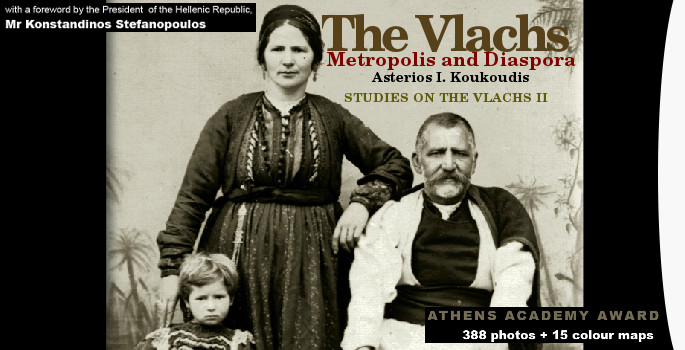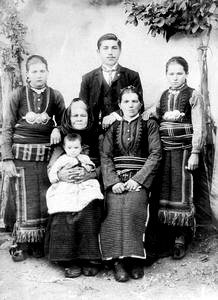News
 In February 2018, the award-winning author and historian Asterios Koukoudis "passed away" suddenly.
In February 2018, the award-winning author and historian Asterios Koukoudis "passed away" suddenly.
He himself, in his public will published in the Magistrates' Court of Thessaloniki, bequeathed to the Public Central Library of Veria the research material about Vlachs and the copyright on his books in Greek and English.
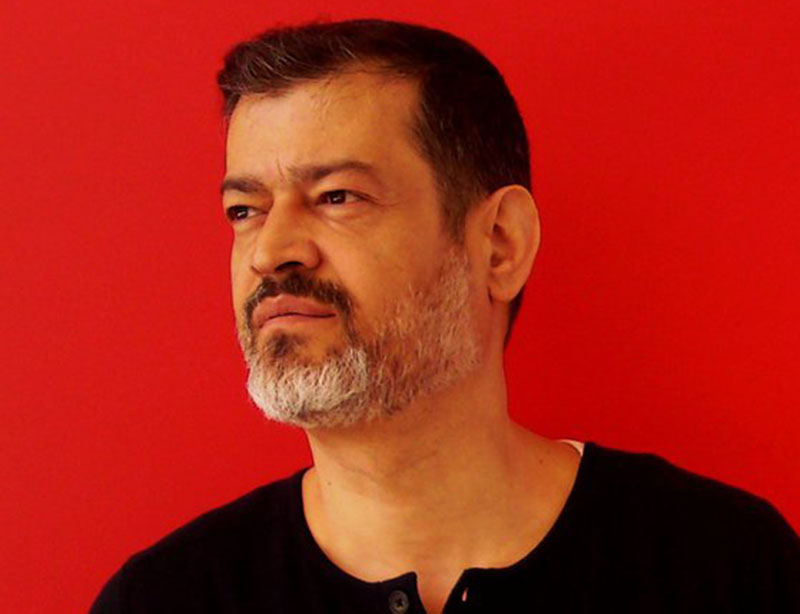 All the records and the copyrights from the books and writings of the historian Asterios Koukoudis are from now on at the Public Library of Veria, on his request which was emplemented after his early death. The Public Library of Veria has the obligation, after the acceptance of the inheritance, to staff a special research department about the Vlachs. The website vlachs.gr will remain active and will be updated under the supervision of Mr. Dimitris Koukoudis.
All the records and the copyrights from the books and writings of the historian Asterios Koukoudis are from now on at the Public Library of Veria, on his request which was emplemented after his early death. The Public Library of Veria has the obligation, after the acceptance of the inheritance, to staff a special research department about the Vlachs. The website vlachs.gr will remain active and will be updated under the supervision of Mr. Dimitris Koukoudis.
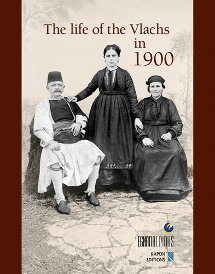 Our identity comes about not as an act of fate, but rather as a formless legacy. In every case, it is shaped by time and place. Bearing this principle in mind, we are broadening the scope of an initiative first taken by the Foundation of the Museum for the Macedonian Struggle in Thessaloniki and the researcher, Mr Asterios Koukoudis. It concerns the populations who first appeared in Byzantine times and who, according to contemporary sources, were referred to as "the Vlachs of Hellas".
Our identity comes about not as an act of fate, but rather as a formless legacy. In every case, it is shaped by time and place. Bearing this principle in mind, we are broadening the scope of an initiative first taken by the Foundation of the Museum for the Macedonian Struggle in Thessaloniki and the researcher, Mr Asterios Koukoudis. It concerns the populations who first appeared in Byzantine times and who, according to contemporary sources, were referred to as "the Vlachs of Hellas".
Our initiative is necessary in order to expose attempts at the transformation, alteration, or indeed the fabrication of cultural features, and also any other departures from long-established Vlach traditions that might be put forward. We believe that such an approach at the present time would, apart from other things, explain the appearance of a Vlach or Aroumanian ethno-linguistic nationalism; particularly since this goes beyond post-modern theoretical questions and attempts to reshape itself into a political agenda. Such a contrivance, if indeed not part of any geo-political ploy, consciously serves economic and petty-political ambitions of either academics or self-appointed professional activists, in addition to all manner of self-seekers in Greece and elsewhere.
The EGNATIA EPIRUS Foundation recognises, promotes and underscores the cultural legacy of the Vlachs as an integral part of our country, and believes the time is ripe for more systematic research and for a clearer presentation of both their historical and present-day self-perception, as well as the current position of the Latin-speaking Romiosyni (Modern Greeks). The Foundation, in its desire to help a wider public understand the theoretical and practical issues, begins this initiative with a presentation of the multi-faceted Vlach identity (local, economic, social, demographic, cultural, etc.), as recorded by the photographic lens in the early 20th century. We feel both justified and proud of this undertaking because of its contribution to the correct interpretation and understanding of current-day Vlach identity.
Ioannis Averoff
Chairman of the Board
EGNATIA EPIRUS Foundation
click to view the full version of the publication (greek edition)
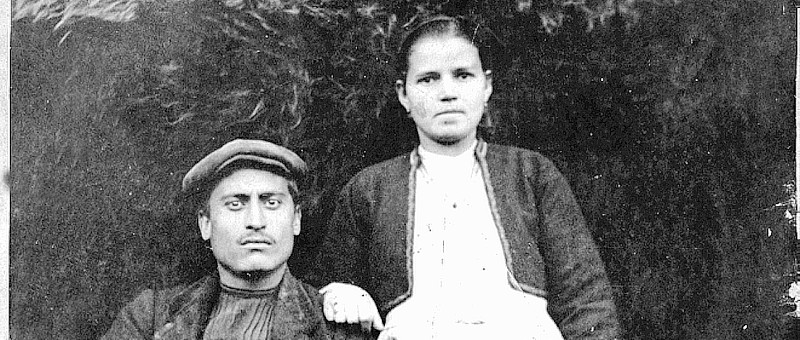 The set of old, black and white photographs which were collected during my researches and were used to enrich the publication of the Studies on the Vlachs, both in Greek and English, was donated to the Museum of the Macedonian Struggle Foundation in Thessaloniki, as a minimum gratitude for the help, and assistance I was offered during my effort getting to know the Vlachs better. These photographs come from various family archives, personal collections, collections of the many Vlach Cultural Associations throughout the country, collections of other museums and institutions, and even from publications of other scholars.
The set of old, black and white photographs which were collected during my researches and were used to enrich the publication of the Studies on the Vlachs, both in Greek and English, was donated to the Museum of the Macedonian Struggle Foundation in Thessaloniki, as a minimum gratitude for the help, and assistance I was offered during my effort getting to know the Vlachs better. These photographs come from various family archives, personal collections, collections of the many Vlach Cultural Associations throughout the country, collections of other museums and institutions, and even from publications of other scholars.
When known, the names of the persons photographed, the time and the location are to be found in detail in the captions as these appear in the publications. When possible, more information such as the source, and often the name of the original photography artist are also given.
Once again, I ought to express my thankfulness to everyone who helped me in order to gather this photographic material, and for the confidence they showed in me. Recognizing the fact that I am not the owner of this priceless heritage treasure I entrusted it, in my turn, to the Museum Foundation for better documentation and further research. It has, for many years now, become part of the museum’s digitized archives and it is available to scholars. Taking the liberty, I would like to express my desire and wish that this collection becomes the primary nucleus of broader, richer collection of photographs and other documentation in relation to the Vlachs. I strongly believe other researchers may discern in these photos hidden figures which I was unable to local and bring to the scientific surface. I kindly call them to study this collection farther and present us with new evidence.
Asteriοs Koukoudis
See the photographic collection
STUDIES ON THE VLACHS
The Vlachs: Metropolis and Diaspora
I. The Vlachs of the Southern Pindos - The Vlachs of Aspropotamos and Malakassi
II. The Vlachs of Zagori and Konitsa
III. The Vlachs of the Northern Pindos: The Vlach villages in the Grevena area
IV. The Arvanitovlachs
V. The Vlachs of Moschopolis and the surrounding area
VI. The Vlachs of Grammos
VII. The Vlachs in north-western Macedonia
 This book attempts a concise yet systematic presentation of the history and cultural identity of the Vlachs, using rare photographs that capture a variety of manifestations of the life of these non-Greek speaking communities at the beginning of the 20th century.
This book attempts a concise yet systematic presentation of the history and cultural identity of the Vlachs, using rare photographs that capture a variety of manifestations of the life of these non-Greek speaking communities at the beginning of the 20th century.
The work enriches the bibliography on ethnography and makes an important contribution to the interpretation and understanding of the modern identity of the Vlachs of Greece.
The book was published in collaboration with the Egnatia Epirus Foundation.
Format: 23.5×29.5 cm. Pages: 64
Illustrations: 226 colour, 12 coloured maps
Binding: paper back
ISBN: 978-960-7037-91-6 (Greek ed.)
ISBN: 978-960-7037-92-3 (English ed.)
Languages: Greek, English
Buy online

